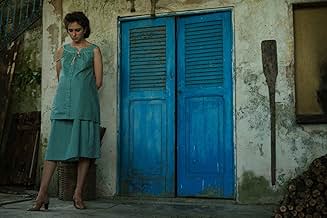VALUTAZIONE IMDb
7,7/10
10.362
LA TUA VALUTAZIONE
Due sorelle nate a Rio de Janeiro si fanno strada attraverso la vita, ciascuna credendo che l'altra stia vivendo i suoi sogni dall'altra parte del mondo.Due sorelle nate a Rio de Janeiro si fanno strada attraverso la vita, ciascuna credendo che l'altra stia vivendo i suoi sogni dall'altra parte del mondo.Due sorelle nate a Rio de Janeiro si fanno strada attraverso la vita, ciascuna credendo che l'altra stia vivendo i suoi sogni dall'altra parte del mondo.
- Regia
- Sceneggiatura
- Star
- Premi
- 38 vittorie e 53 candidature totali
Gregório Duvivier
- Antenor
- (as Gregorio Duvivier)
Recensioni in evidenza
If you're interested in a deep view of Brazilian life and culture, look no further than this wonderful film. The characters are real, they love and fight intensely, the way Brazilians do. This was a wonderful time capsule of Brazil in the 1950's.
I cannot understand the low-ratings from people who won't watch because they won't read subtitles! You've cheated yourself out of an amazing experience.
I cannot understand the low-ratings from people who won't watch because they won't read subtitles! You've cheated yourself out of an amazing experience.
This film is a piece of art. The acting, the cinematography and the soundtrack are all great. It will make you sad, though. As a woman, it hits me even harder seeing the amount of injustice these sisters went through. One of the merits of this story is that it showed how much women were oppressed in their daily, middle class lives. There's no evil villain here, these girls are victims of their own society, of their own family, of people who don't even realize the extent of the harm they are causing.
I do think it has its flaws, some pacing issues maybe, but overall it's a great movie that actually made me feel the agony, melancholy and frustration of the characters and reflect about how this was (and unfortunately still is) the reality for many women around the world.
I do think it has its flaws, some pacing issues maybe, but overall it's a great movie that actually made me feel the agony, melancholy and frustration of the characters and reflect about how this was (and unfortunately still is) the reality for many women around the world.
My biggest turndown with Invisible Life's biggest competition inside Brazil this year ('Bacurau') was the excess of metaphors to make it a smart work -- some of which have absolutely no contibution to the story. Still, it was able to provoke a lot of emotional reactions, it's specially smart and meaningful to watch from a Brazilian perspective. Invisible Life is something different, it's universal, delicate and rough at the same time, and it's story has no need to explaining -- we all know what it is about. Still, they explain (the only reason why it's not a 100% for me).
Carol Duarte and Julia Stockler are incredible. Also need to mention the short appearance from Brazil's greatest actress of all time, Academy Award nominee Fernanda Montenegro, not only for the name but mostly because, after 120 minutes of the movie, her performance was still able to reach out to the emotions you built for the characters in the past 2 hours.
Overall, absolutely beautiful. The film is a visual spectacle, but also a beautiful and touching story.
This movie has many good things in it: the sisters are very well cast and the acting in general is inspired.
Locations, costumes and colors are absolutely on point.
I just didn't really enjoy the plot and the script... I understand that this is meant to be a representation of repressive society, but the characters don't act as normal people would and I find it unnerving since this was meant to be a dramatic/realistic movie.
Greetings again from the darkness. Masterful storytelling when combined with expert filmmaking is a treasure to be appreciated and enjoyed, even if the story is not so pleasant. Such is the case with this gem from writer-director Karim Ainouz, who adapted the screenplay with Murilo Hauser and Ines Bortagaray from the novel "The Invisible Life of Euridice Gusmao" by Martha Bathala. Based in Rio de Janiero, the film blends the vibrant colors of the area with the traditional and restrictive Latin American family expectations of the 1950's.
The story spans 5 or 6 decades, and when we first meet sisters Euridice and Guida, it's clear they share a tight emotional bond that goes deeper than blood. Though their personalities differ greatly, they are both ahead of their time and out of step with the conventions of the era. Euridice (a strong performance by Carol Duarte) longs for independence and aspires to be a concert pianist after a hoped-for Conservatory in Vienna, while Guida (a powerhouse Julia Stockler) is a dreamer seeking true love, and whose party girl ways must be kept hidden from their conservative father. Both young ladies are spirited, yet respectful.
Their lives are forever altered when Guida runs off to Greece with her sailor lover. As is too often the case with young dreamers, she returns home once her spontaneous choices prove to be poor judgment. Her father rejects his pregnant daughter since, in his eyes, she has disgraced the family. The parents mislead Guida about her sister's whereabouts, so Guida assumes Euridice is off at conservatory fulfilling her dreams. This sets Guida off on her own solitary path.
In actuality, Euridice has married and experienced one of the worst ever wedding nights, featuring what is likely cinema's most unsexy bathroom lovemaking scene. There is an element of horror films to this segment of the film, as the sisters are living their worst nightmares, while being separated from each other ... unable to communicate. The male-dominated Latin culture and family traditions prevent their mother from 'disobeying' the father's order, so the cruel lie continues as the sisters unknowingly live their lives within the same town. There is even one excruciatingly painful-to-watch scene that finds them in the same restaurant at the same time, yet oblivious to the presence of the other.
Each woman's inner-strength pushes them forward. Guida (now Gisele) befriends a wise former prostitute Filomena (an excellent Barbara Santos) who becomes her mentor in poverty. Euridice tries to make the best of her situation while keeping her dream alive. Mostly what we have is a tragic story without one specific tragedy - other than the daughter spurned by her father. There are so many moments of pain and frustration, with undelivered mail being among the worst. The film is beautifully shot by cinematographer Helene Louvart, and it reminds us that 'life happens', and it's not all love and Bach. This is an emotional and heart-breaking story, and devotees of The Lifetime Channel will likely be disappointed in the ending. For me, I have no qualms about the emotional wringer the film puts viewers through - even after the opening scene foreshadowing.
The story spans 5 or 6 decades, and when we first meet sisters Euridice and Guida, it's clear they share a tight emotional bond that goes deeper than blood. Though their personalities differ greatly, they are both ahead of their time and out of step with the conventions of the era. Euridice (a strong performance by Carol Duarte) longs for independence and aspires to be a concert pianist after a hoped-for Conservatory in Vienna, while Guida (a powerhouse Julia Stockler) is a dreamer seeking true love, and whose party girl ways must be kept hidden from their conservative father. Both young ladies are spirited, yet respectful.
Their lives are forever altered when Guida runs off to Greece with her sailor lover. As is too often the case with young dreamers, she returns home once her spontaneous choices prove to be poor judgment. Her father rejects his pregnant daughter since, in his eyes, she has disgraced the family. The parents mislead Guida about her sister's whereabouts, so Guida assumes Euridice is off at conservatory fulfilling her dreams. This sets Guida off on her own solitary path.
In actuality, Euridice has married and experienced one of the worst ever wedding nights, featuring what is likely cinema's most unsexy bathroom lovemaking scene. There is an element of horror films to this segment of the film, as the sisters are living their worst nightmares, while being separated from each other ... unable to communicate. The male-dominated Latin culture and family traditions prevent their mother from 'disobeying' the father's order, so the cruel lie continues as the sisters unknowingly live their lives within the same town. There is even one excruciatingly painful-to-watch scene that finds them in the same restaurant at the same time, yet oblivious to the presence of the other.
Each woman's inner-strength pushes them forward. Guida (now Gisele) befriends a wise former prostitute Filomena (an excellent Barbara Santos) who becomes her mentor in poverty. Euridice tries to make the best of her situation while keeping her dream alive. Mostly what we have is a tragic story without one specific tragedy - other than the daughter spurned by her father. There are so many moments of pain and frustration, with undelivered mail being among the worst. The film is beautifully shot by cinematographer Helene Louvart, and it reminds us that 'life happens', and it's not all love and Bach. This is an emotional and heart-breaking story, and devotees of The Lifetime Channel will likely be disappointed in the ending. For me, I have no qualms about the emotional wringer the film puts viewers through - even after the opening scene foreshadowing.
Lo sapevi?
- QuizBrazil's official submission for the 'Best Foreign Language Film' category at the 92nd Academy Awards in 2020. Runner-up was Bacurau (2019).
- ConnessioniFeatured in Conversa com Bial: Episodio datato 4 luglio 2019 (2019)
I più visti
Accedi per valutare e creare un elenco di titoli salvati per ottenere consigli personalizzati
Dettagli
- Data di uscita
- Paesi di origine
- Siti ufficiali
- Lingue
- Celebre anche come
- La vita invisibile di Eurídice Gusmão
- Luoghi delle riprese
- Pedregulho Housing Complex - Rua Marechal Jardim, São Cristóvão, Rio de Janeiro, Brasile(elder Euridice's apartment)
- Aziende produttrici
- Vedi altri crediti dell’azienda su IMDbPro
Botteghino
- Lordo Stati Uniti e Canada
- 146.535 USD
- Fine settimana di apertura Stati Uniti e Canada
- 8127 USD
- 22 dic 2019
- Lordo in tutto il mondo
- 1.776.017 USD
- Tempo di esecuzione2 ore 19 minuti
- Colore
- Proporzioni
- 2.39 : 1
Contribuisci a questa pagina
Suggerisci una modifica o aggiungi i contenuti mancanti

Divario superiore
What is the Japanese language plot outline for La vita invisibile di Euridice Gusmao (2019)?
Rispondi





























